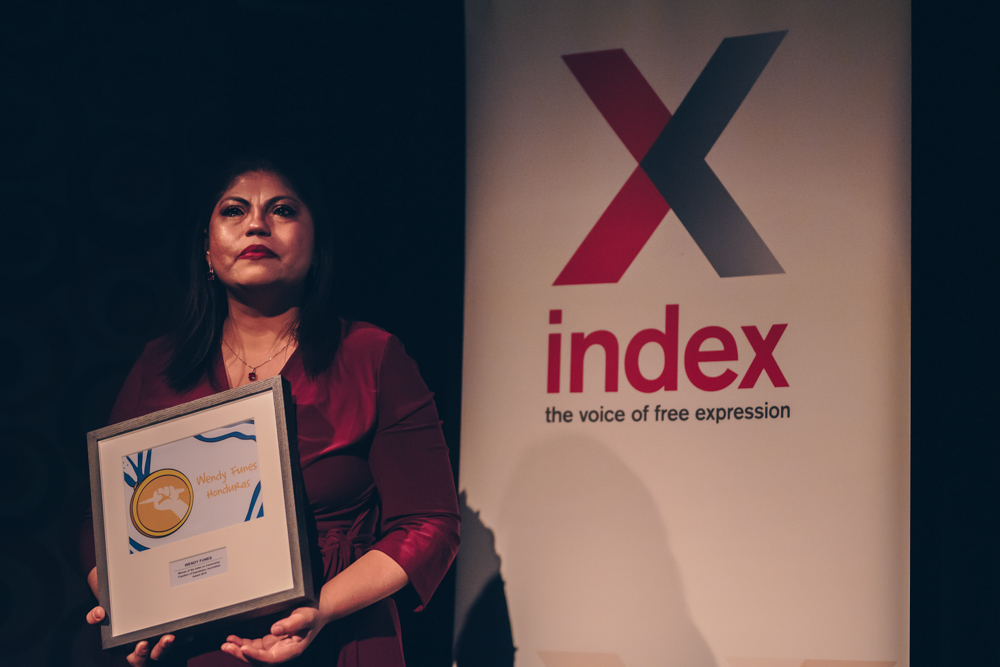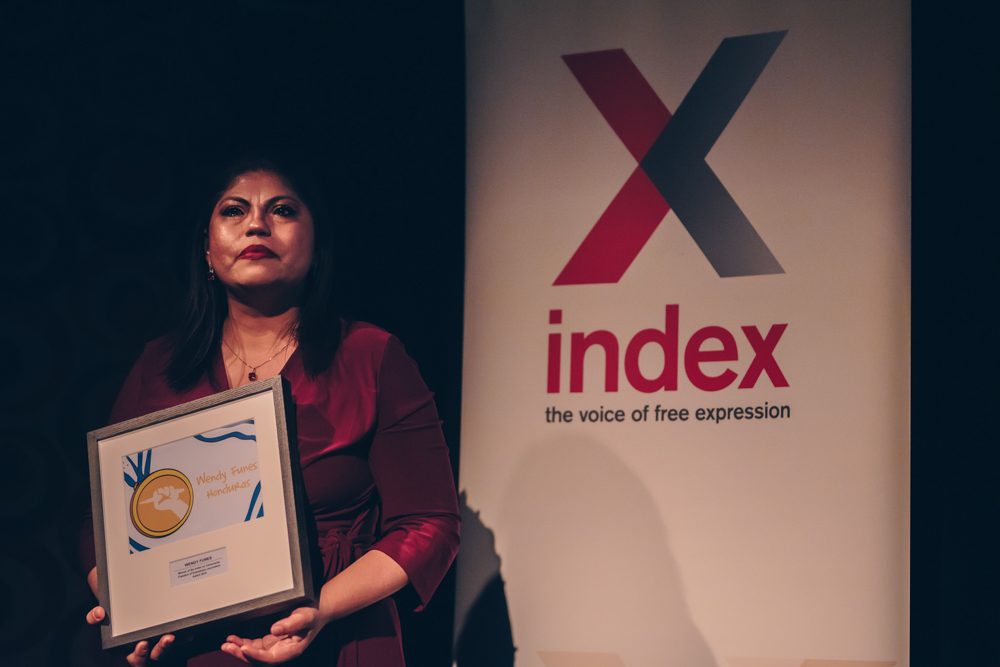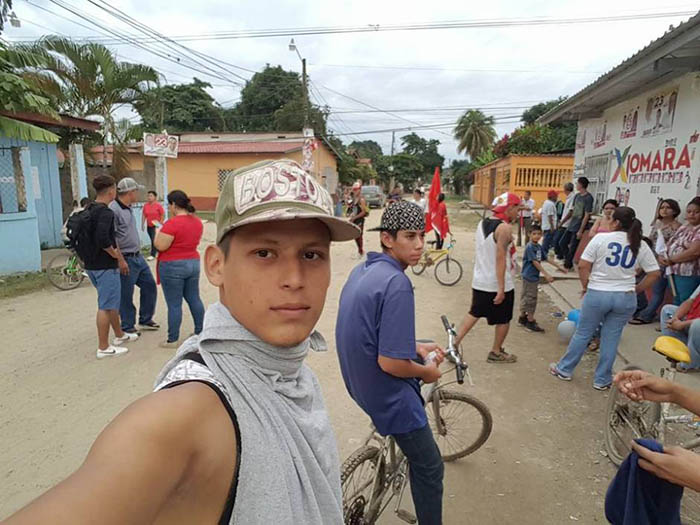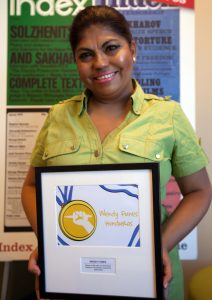Index relies entirely on the support of donors and readers to do its work.
Help us keep amplifying censored voices today.
[vc_row][vc_column][vc_column_text]

2018 Freedom of Expression Journalism Award-winner and 2018 Journalism Fellow Honduran investigative journalist Wendy Funes at the 2018 Index on Censorship Freedom of Expression Awards (Photo: Elina Kansikas for Index on Censorship)
“Despite my fears and the pain that violence has left in my country, it has been wonderful to see that it has been worthwhile to dream in a world with so much solidarity,” Wendy Funes, winner of the 2018 Index on Censorship Freedom of Expression Awards Fellowship for Journalism, told Index on Censorship.
Freedom of expression has suffered a steep decline in Honduras, a country where 70 journalists have been killed over the last nine years, with Gabriel Hernández’s murder on 17 March marking the first of 2019. Wendy Funes, an investigative reporter who runs her own online news website, Reporteros de Investigacion, is one of the few remaining journalists in the country that continues reporting and investigating issues despite the immense pressure to remain silent.
As a woman journalist in Honduras, a country in which gender-based violence is a serious issue, as is violence against journalists, Funes finds it important to attend events for women in leadership, such as the one she attended in Mexico City with the Center for Women’s Global Leadership.
“It helped me to realise that I am not alone in the continent and to know that there are other places with women who are specialised and do methodical and rigorous work,” said Funes.
Although she has faced a great deal of adversity as a woman journalist, Funes considers herself lucky having been given the opportunity to study and have a career in journalism, when seven out of every ten Hondurans live in poverty, with more than a million children without access to school and a small percentage of people who finish high school.
2019 is proving to be a busy year for Funes as she undertakes a new project, Sembrando el Periodismo de Investigacion en Honduras, with the help of a grant from National Endowment for Democracy. The project consists of four major investigations, two of which Funes and her team are currently working on.
The first is an investigation into the Trans 450, a transmetro that was promised to Hondurans and cost them $9 million, but has not been put into operation yet. The second investigation examines the impunity on aggressions against freedom of expression.
“The NED project is our first significant project and the support and respect they have shown for our work is really important to us,” said Funes.
The biggest project Funes has planned for the future, however, is the building of a Centre for Investigative Journalism that will be the first centre of its kind in Honduras.
“We want the office to become a training space for press and media professionals, advocates, professionals from universities, and academics who wish to learn,” said Funes.
In preparation for building the centre, Funes and her team are working with Factum magazine of El Salvador to train journalists and students. They will hold the first workshop in April of this year and the hope is that they will develop a network of journalists that will then serve as the foundation for the Centre for Investigative Journalism.
“For now, our priority is to strengthen our office and our business model, to nurture alliances and strengthen the network that will one day become the centre we are talking about,” said Funes.
Being an Index fellow has opened up many new opportunities for Funes, but has also renewed her own sense of confidence in herself as a woman and as a journalist.
“Index appeared in my life as a gift of providence and helped me at a very fundamental moment because the award coincided with the year I made the decision found my own newspaper,” said Funes. “They showcased me and my work and many more people followed in encouraging and supporting me.”[/vc_column_text][/vc_column][/vc_row][vc_row][vc_column][vc_basic_grid post_type=”post” max_items=”4″ element_width=”6″ grid_id=”vc_gid:1554114253076-1aebf9f6-f8dd-7″ taxonomies=”10735″][/vc_column][/vc_row]
[vc_row][vc_column][vc_column_text]

2018 Freedom of Expression Journalism Award-winner and 2018 Journalism Fellow Honduran investigative journalist Wendy Funes at the 2018 Index on Censorship Freedom of Expression Awards (Photo: Elina Kansikas)
“Violence is a way of keeping society under control because a lot of what people do or don’t do is a reaction to fear,” Wendy Funes, winner of the 2018 Index on Censorship Freedom of Expression Awards Fellowship for Journalism, tells Index on Censorship. “It becomes an indirect method of control, not just over society, but journalism as well.”
Funes worries this kind of violence has become “normalised” in Honduras and says the shooting and wounding of journalist Geovanny Sierra — who has survived numerous attempts on his life — by military police while covering protests of electoral fraud in late November is just the latest example. The Honduran authorities issued a statement saying that law enforcement was attacked first, which is why they started shooting. “With this they have justified the crime,” Funes says, adding that nothing is being done about the attacks on journalists in the country: “The most terrible thing is the impunity that exists because if something like this happened in another country it would a scandal, but here it is already forgotten.”
Funes is no stranger to covering either corruption or protest and has had her own brushes with heavy-handed state forces, although she says for the most part she has been lucky. “I’ve had training opportunities in self-protection and security,” she says. “I am also very cautious — I try to plan my routes and if I go inter dangerous areas, I try to have a safety protocol, to have alliances with civil society groups, so if something happens to me I can let them know.”
Recently, Funes’ investigative website Reporteros de Investigacion has been focusing on issues such as human trafficking, violence against student protesters, femicide and the high-level cocaine trafficking case involving Juan Antonio Hernández, brother of Honduran president Juan Orlando Hernández. The website has also been covering the caravan of people fleeing persecution, poverty and violence in the country. “They are facing a very cruel situation,” Funes says.

Honduran migrant Daniel Portillo
Although Reporteros de Investigacion doesn’t have the resources to cross the border, it has been working closely with some of those who have fled, such as 25-year-old Daniel Portillo, who left Honduras in search of the “American dream”. Portillo is now in Mexico. “He has found someone who works with migrants and helps migrants,” Funes, who first met him when she was covering protests in San Pedro Sula, a city in the northwest of Honduras, said. “He is a young person with a lot of leadership qualities, a lot of desire to advocate for other young people.”
While in Honduras Portillo organised sports tournaments in an area controlled by the criminal gang MS-13. “He resisted joining the gang,” Funes says. “He was always trying to negotiate with them so that he could help other young people so they wouldn’t get into drugs or alcohol.”
Writing in Reporteros de Investigacion, Portillo explains the difficulty of explaining to his young daughter that he left so she could have a better future: “If God allows it, we will see each other again or else, I am writing this letter to you in case unfortunately they killed me on the way and buried me; my heart is that of a warrior and I will continue forward, whatever happens, my mother suffers for my departure.”
“He told me that he has seen many people carved up since he was a child,” Funes tells Index. “Violence weighed on his psyche and made him very vulnerable young person. He told me that he looked for employment in Honduras, and when he could not find he decided to migrate with the caravan.”
It is such vulnerability that makes poor Hondurans so susceptible to human trafficking. “It’s like Russian roulette,” Funes says. “I have come to realise that there are many Hondurans who have an eagerness to migrate to the USA, but have ended up staying in countries like El Salvador, Guatemala, Mexico and Belize and have become victims of sexual exploitation, domestic service and forced matrimonies as they flee from gangs and narco-politics. Some of the people who have left come back mutilated because they lose limbs on the trains.”
For those that do make it to the USA, they face discrimination, but at least they have the opportunity for better salaries, with which they can send money to their families struggling back home, Funes says. These remittances play a key role in sustaining the Honduran economy. In May 2018 Hondurans abroad sent back an all-time high of $456.2 million in a single month.
While Funes would like to see more Hondurans stay at home, not only to avoid the very real risks that come with being a migrant, but also to fight for real change, she is all too aware of why people choose instead to leave. “You have to work five times harder than a corrupt individual to be able to sustain yourself and get ahead in Honduras. This economic model displaces the most vulnerable individuals.”
Much of what Funes and her team do over the next year will be geared towards her dream of founding a centre of investigative journalism, including training journalists and students with the help of Factum magazine in El Salvador. “This will bring together many different journalists who want to transform Honduras with investigative journalism,” Funes says.
With a grant from the National Endowment for Democracy, Funes and her team will also work on a project called Sembrando el Periodismo de Investigación en Honduras (Sowing Investigative Journalism In Honduras), which will involve four major investigations over the course of 2019.
“Many of the things that I dreamt of happening one day, in an idealistic way, have become reality, all thanks to Index,” Funes adds. “Solidarity, love and friendship are really the things that can move this world, and that is what Index is made of with all of the support they have extended to me.”
[/vc_column_text][/vc_column][/vc_row][vc_row][vc_column][vc_basic_grid post_type=”post” max_items=”4″ element_width=”6″ grid_id=”vc_gid:1561460137741-61f82764-3b8a-4″ taxonomies=”23255″][/vc_column][/vc_row]
[vc_row][vc_column][vc_single_image image=”100749″ img_size=”full”][vc_column_text]Two days after the publication of an investigation into alleged inappropriate behaviour by a member of a Honduran military unit involving young female students, digital newspaper Reportero de Investigacion was targeted with a misleading story that purported to be from the outlet.
The news outlet, which was founded by 2018 Freedom of Expression Awards Fellowship winner Wendy Funes, had posted an 8 June 2018 article which exposed how members of a military unit were going into schools, teaching children without parental consent or notification, collecting personal information and, in at least one case, texting sexually harassing messages under the guise of the “No Drugs, Live Better” programme. The Reportero de Investigacion article included screenshots of a text conversation between a mother and a military officer. The officer thought they were texting the woman’s daughter.
The publication drew a large amount of the attention in Honduras, which is one of the world’s most dangerous places to be a journalist.
Two days later, a faked article began appearing that used the Reportero de Investigacion logo and included screenshots from gang members who discussed the difficulties of distributing drugs, claiming they had less access after the military had begun its in-school training programme. The false article is being shared on WhatsApp groups among members of the law enforcement community in Honduras, Funes told Index on Censorship.
This is not the first time that fake news stories have been circulated in Honduras to discredit the work of investigative journalists and human rights activists and undermine their personal security.
For Funes, it is vital that the appropriate government agencies investigate these false publications. She said she will be addressing a complaint to the new Honduran Special Prosecutor for the Protection of Human Rights Defenders, Journalists, Social Communicators and Justice Operators, (FEPRODDHH), which has the responsibility for determining where the faked article purporting to be from reporterosdeinvestigación.com came from.
“For us it is necessary to carry out an investigation, although we do not have the certainty that it is a smear campaign against our newspaper, we believe that an investigation is urgent to determine the origin of the messages and the State has the tools necessary to do it.” Funes said.
Perla Hinojosa, fellowships and advocacy officer at Index on Censorship said: “It’s important to call out efforts to discredit the investigative work of journalists like Wendy. Even though this was not a direct physical threat, the spread of false information undermines Wendy’s news organisation, which seeks justice and identifies human rights abuses.”[/vc_column_text][/vc_column][/vc_row][vc_row][vc_column][vc_basic_grid post_type=”post” max_items=”12″ style=”load-more” items_per_page=”4″ element_width=”6″ grid_id=”vc_gid:1528734389898-5507b00f-068d-2″ taxonomies=”23255″][/vc_column][/vc_row]
[vc_row][vc_column][vc_video link=”https://youtu.be/Cc3K8Bcvt6Y”][vc_column_text]

2018 Freedom of Expression Journalism Award-winning Honduran investigative journalist Wendy Funes. (Photo: Index on Censorship)
Wendy Funes is an investigative journalist from Honduras who regularly risks her life for her right to report on what is going on in the country. She is a courageous female voice, writing in a violent and corrupt society where two journalists have been killed this year and where women are regularly subjected to severe domestic violence and often killed. Funes is an inventive and passionate human rights reporter. For one article she got her own death certificate issued so that she could show up with the corruption in the civil registration office. For another one, they will be forced to fight for an investigation into children being forced to take to the streets of the country’s capital.
Looking out of one of the windows of my house a few days ago, while thinking about what to say this afternoon, I remembered the paradise tree in the garden which my childhood swing used to hang from. When it withered and died, I felt devastated. But now, forty years later, there are four big trees growing in its place and are all fruit-bearing.
For me, this award is so immense and significant that I can only explain it and express my thanks for it with a story that I have never told until now.
It is a story about a small fatherless child, yet another child left fatherless by the armed violence in Honduras. It is a story about a childhood filled with sadness. But the child learnt that whatever the circumstances, courage and strength are necessary to achieve one’s dreams: and the first step is always to dream.
In 2002 she began her first investigations as a journalist and it gave meaning to her life. But in 2008, censorship forced her to leave her dream job at the newspaper and by 2011 her constant fight for free expression and to tell the truth meant that all the doors to the media monopoly was closed to her.
But once again journalism saved her. She discovered that frustration with censorship is not the way. Rather, the way to overcome censorship is with the word, and although some doors were closed to her, doors to a more humane, less commercial, more rigorous kind of journalism were opened. The kind of journalism that investigates and pauses on each word, that does not proclaim impartiality but seeks the truth. The kind of journalism that is capable of showing her people that their society is being governed by drug trafficking and ruthless groups who since the 2009 coup have sacrificed lawyers, doctors, women, 70 journalists and executed young people in an almost invisible genocide.
The kind of journalism that can identify with a nation governed by someone who was rejected at the polls. Someone who controls the press that, in turn, covers up military assassinations, the corruption of officials and the everyday cruel realities for the Honduran people. Realities such as the 14-year-old girl sold by her father for a litre of alcohol whilst already pregnant, or the new-born baby who died of malnutrition and weighed more when he was born than when he died. In short, so many stories to tell. So many stories that the press is censored from telling.
But the young girl with whom this story began has been so fortunate that by refusing to remain silent and refusing to become part of this cruel system, by telling stories that a journalist should tell, she is being shown once again that the courage to dream is well-rewarded. That there is always someone willing to extend their hand and say “Come on, it’s worth resisting, it’s worth dreaming and fighting to transform all of this pain into a reward.” A reward which gives me hope.
I dedicate this prize to my fellow people of Honduras who demonstrate every day that they wish to move forward and overcome the violence, impunity and corruption which have been afflicting us for more than three decades.[/vc_column_text][/vc_column][/vc_row][vc_row disable_element=”yes”][vc_column width=”1/2″][vc_single_image image=”84882″ img_size=”full” alignment=”center”][vc_column_text]
For his one-man protests, Ildar Dadin was sent to prison in December 2015 where he was tortured, before his conviction was quashed in February 2017. Read the full profile.[/vc_column_text][/vc_column][vc_column width=”1/2″][vc_single_image image=”84888″ img_size=”full” alignment=”center”][vc_column_text]
Despite the persecution he faces for his work, Rebel Pepper continues to satirise the Chinese state from a life in exile in Japan. Read the full profile
[/vc_column_text][/vc_column][/vc_row][vc_row disable_element=”yes”][vc_column width=”1/2″][vc_single_image image=”84889″ img_size=”full” alignment=”center”][vc_column_text]
Established in 2015, Turkey Blocks is an independent digital research organisation that monitors internet access restrictions in Turkey. Read the full profile.
[/vc_column_text][/vc_column][vc_column width=”1/2″][vc_single_image image=”84887″ img_size=”full” alignment=”center”][vc_column_text]
Maldives Independent, the Maldives’ premiere English publication and one of the few remaining independent media outlets, was formed in exile in Sri Lanka in 2004. Read the full profile.
[/vc_column_text][/vc_column][/vc_row][vc_row][vc_column][vc_column_text]Mirando por una de las ventanas de mi casa, un par de días atrás, mientras pensaba en qué decir esta tarde, me acordé del árbol de Paraíso del jardín, desde el cual colgaba el columpio de mi niñez. Cuando se marchitó y se murió, me sentí desconsolada. Sin embargo ahora, unos treinta años después, ahí hay cuatro árboles grandes creciendo en su lugar y todos rinden fruta.
Para mí, este premio es tan inmenso e importante que solo puedo explicar y expresar mi agradecimiento con un cuento que, hasta ahora, nunca he relatado.
Es un cuento de una niña chiquita sin padre. Otro niño más dejado sin padre por la violencia armada en Honduras. Es un cuento de una niñez llena de tristeza. Pero la niña aprendió que en toda circunstancia, la alegría, el coraje y la fuerza son necesarios para lograr sus sueños: y el primer paso siempre es soñar.
En 2002 ella empezó sus primeras investigaciones como periodista y eso le dió un significado a su vida. Pero en 2008, la censura la obligó a dejar el trabajo de sus sueños en el periódico y en 2011, su constante lucha por la libertad de expresión y de exponer la verdad, significó que todas las puertas del monopolio le fueron cerradas.
Pero una vez más, el periodismo la salvó. Ella descubrió que luchar contra la censura, no era el mejor método. Más bien, el mejor método de combatir la censura era a través de la palabra, y a pesar de que algunas puertas le fueron cerradas, se le abrieron otras a otro tipo de periodismo más humano, menos comercial y más riguroso. El tipo de periodismo que investigaba y que hacía una pausa en cada palabra, el que no proclamaba la imparcialidad pero que buscaba la verdad. El tipo de periodismo capaz de enseñar a su pueblo que la sociedad está siendo gobernada por el tráfico de drogas y grupos despiadados, quienes, desde el golpe de Estado del 2009, han sacrificado a abogados, médicos, mujeres, unos setenta periodistas y han ejecutado a jóvenes en un casi invisible genocidio.
El tipo de periodismo que puede identificarse con una nación gobernada por una persona que fue rechazada en las elecciones. Una persona que controla la prensa, y que por ende encubre asesinatos, la corrupción de los oficiales y las crueles realidades cotidianas que sufre el pueblo de Honduras. Realidades tales como la muchacha de catorce años vendida por su padre por un litro de alcohol y mientras estaba embarazada, o el infante recién nacido que murió por la malnutrición y cuyo cuerpo pesaba más cuando nació que cuando murió.
Pero la jóven muchacha con quien empezó este cuento, ha sido tan afortunada que, por negarse a mantenerse callada y por negarse a ser parte de este cruel sistema, por contar cuentos que un periodista debería contar, está comprobando una vez más que el coraje de soñar está bien recompensado. En resumidas cuentas, hay tantos cuentos que contar. Tantos cuentos que la prensa está censurada de contar. Que siempre haya alguien que esté dispuesto a extender la mano y decir, Vamos, vale la pena resistir, vale la pena soñar y luchar para transformar todo este dolor en una recompensa>. Una recompensa que me da esperanza.
Dedico este premio a mis compatriotas de Honduras porque ellos demuestran todos los días, el deseo de salir adelante y vencer la violencia, impunidad y corrupción que nos han estado afligiendo con mayor calamidad en las últimas tres décadas.[/vc_column_text][/vc_column][/vc_row][vc_row][vc_column][vc_basic_grid post_type=”post” max_items=”12″ style=”load-more” items_per_page=”4″ element_width=”6″ grid_id=”vc_gid:1524235559634-0014c057-81cc-3″ taxonomies=”8935″][/vc_column][/vc_row]